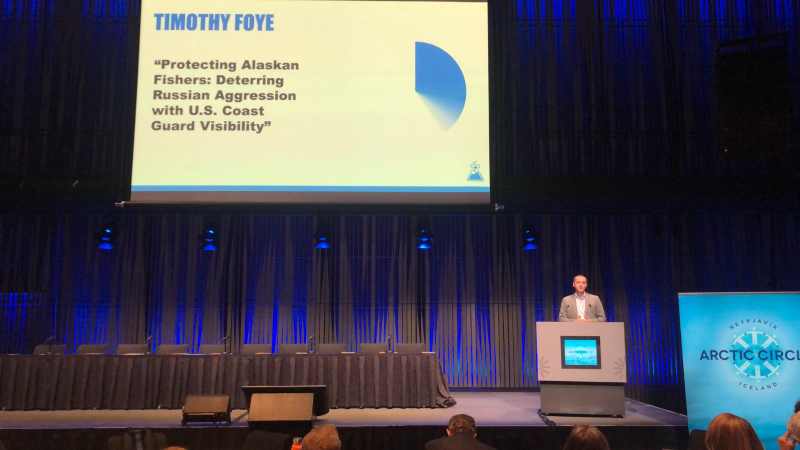
Perception of Russian Militarization of the Arctic: Fletcher at the 2023 Arctic Circle Assembly
By Timothy Foye, MALD 2024 Candidate, The Fletcher School
In October 2023, I had the opportunity to attend and participate in the Arctic Circle Assembly, hosted annually in Reykjavik, Iceland. The conference is a gathering of everyone with any interest relating to the Arctic–be it climate change, energy resources, fishing, indigenous populations, shipping, multilateral cooperation, or security. Experts from academia, government, and business, as well as citizens from across the Arctic, came together for three days of conversations on all these topics and more. I was part of a group of over 30 Fletcher students, staff, and faculty in attendance, signifying the commitment of the school and its Maritime Studies Program to the Arctic.
I participated in the Arctic Innovation Lab, a competition that brings together young leaders with innovative solutions for Arctic problems. Sharing my concern about the Russian military pushing U.S. fishers out of the U.S. Exclusive Economic Zone (EEZ), I proposed establishing permanent U.S. Coast Guard (USCG) bases along the Alaskan coast to protect U.S. interests and deter Russian aggression. My pitch was based on my academic research on Russian militarization of the Arctic, specifically relating to the Bering Sea and Alaska’s western coast. In this research, I found that the Russian Navy’s military exercises in the U.S. EEZ intimidate fishers, threatening their livelihoods. The USCG does not have the bandwidth nor the personnel currently stationed in Alaska to address this challenge. Thus, expanding USCG resources and personnel in the region will meet the emerging security needs of Alaskan coastal communities.

A consistent topic across roundtables and panel discussions was Russia’s role in the Arctic, specifically the challenge it poses to longstanding regional cooperation and multilateralism. There was consensus amongst attendees that cooperation with Russia is not feasible in the near term, possibly even in the medium term. Russia is a major player in the Arctic with both the largest territory and the highest population. However, since Russia’s invasion of Ukraine, Russia has been noncooperative toward other Arctic states and Arctic-inclined entities. In his plenary speech on the final day of the conference, Admiral Rob Bauer, Chairman of the NATO military committee, stated that General Valery Gerasimov, Chief of the General Staff of the Russian Armed Forces, has refused to speak with him since February 2022.
The lack of communication with Russia makes operating in the Arctic increasingly challenging and dangerous for Arctic residents and transients alike. This is particularly true since the Northern Sea Route passes along Russia’s northern coast and Russia is responsible for most search and rescue operations in the High North. In line with the perception of a disengaged Russia, there was minimal if any presence of Russian government representatives and academics at the conference. A lack of cooperation with the Arctic’s largest country significantly threatens the multilateralism that has prevailed in the Arctic over the past three decades.

Other prominent actors in the Arctic include China, a self-proclaimed “near-Arctic state” with increasing interest in the Arctic despite not having a direct territorial claim to the region. Representatives from the Chinese government, universities, and think tanks were prominent at the conference, hosting several events and presenting a “win-win” relationship for Arctic states and increased Chinese presence in the Arctic. The difference between transatlantic views on China was on display at the conference. U.S. representatives argued that China’s interest and involvement in the Arctic is nefarious, while European attendees cautioned that China’s involvement is opaque but not necessarily harmful. Bauer contrasted NATO’s perceptions of Russia and China, addressing Russia as an adversary and China as a competitor. He explained that he maintains regular contact with his Chinese counterparts, while communication with Russia remains nonexistent.
The conference furthered my academic interest in studying Russia-China cooperation in the Arctic and how their increased joint regional presence hinders U.S. interests. Perhaps Arctic multilateralism among Western countries can be a foundation for countering this rising Russia-China threat. In a region where seven out of eight Arctic states are members of NATO, working closely on vast shared threats together with other Arctic-inclined countries such as Japan is an opportunity that cannot be overstated. Stay tuned for further insight on that in my upcoming capstone project.
My attendance and participation were made possible with generous funding from the Fletcher Russia and Eurasia Program, the International Security Studies Program, and the Hitachi Center for Technology and International Affairs. Namely, I would like to thank Arik Burakovsky, Professor Richard Shultz, and Professor Josephine Wolff for their support and contribution.
